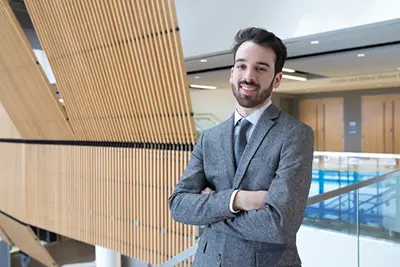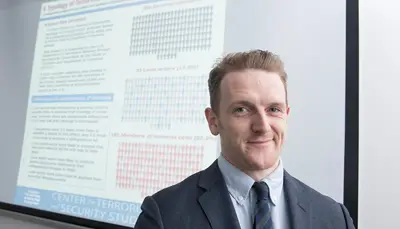Asst. Prof. Neil Shortland Studies How Personality, Values Affect Decision-making
 Image by K. Webster
Image by K. Webster
01/15/2020
By Katharine Webster
A bomb goes off at one entrance to a crowded sports stadium. There are multiple casualties, and the exit is blocked.
You’re in charge of the response, and you have moments to make a critical decision. Do you rush first responders to the scene through other entrances, knowing that a second bomb could detonate and kill them as well? Or do you first clear the area and send in bomb-sniffing dogs, knowing that some of the injured might die?
Asst. Prof. Neil Shortland in the School of Criminology and Justice Studies researchers how people make critical decisions in situations that call for a rapid choice between two equally bad or uncertain alternatives, known as “least-worst decision-making.” Now, he’s won a prestigious National Science Foundation CAREER grant to expand his research.
The $420,000, five-year grant is part of the NSF’s Faculty Early Career Development Program. CAREER awards go to young faculty who show potential to become leaders in their field and to develop research methods that others can use. Other recent winners on campus include Asst. Prof. Miko Wilford in psychology, Asst. Prof. Sheree Pagsuyoin in civil engineering and Asst. Prof. Hsi-Wu Wong in chemical engineering.
Shortland’s new grant builds on a $531,000 three-year grant from the U.S. Army Research Institute to study military decision-making in high-stakes, high-uncertainty situations, and to compare it to decision-making by police officers and civilians who are not military veterans.
Working with the HEROES center on campus, the U.S. Army Natick Soldier Systems Center and researchers from the University of Liverpool and Tufts University, Shortland developed a computer research tool, the Least-worst Uncertain Choice Inventory For Emergency Responses (LUCIFER).
Using the tool, research subjects are presented with emergency scenarios, complete with visual cues and sound effects, and asked to make a choice about how to respond. They are also tested for certain psychological traits and values. Values are difficult to assess, but Shortland says that Asst. Prof. of Psychology Joseph Gonzales helped him come up with “really clever ways of measuring them.”
That study, now in its third year, has found that there are unique differences in the decision-making processes of soldiers, police officers and college students. One finding is that people within groups that have a strong value hierarchy – a clear idea of what is the most important value within a given situation – often find it easier to make crucial life and death decisions.
On the other hand, people with complex and competing values, such as saving civilian lives versus saving the lives of fellow officers and first responders, can freeze when asked to decide between the two – resulting in a delayed decision or no decision at all during a crucial time period, Shortland says. Essentially, they’re stuck in an internal debate between what Shortland and his colleagues call “colliding sacred values.”
“Good decision-making is a bit about personality, a bit about the situation and a bit related to the group you’re a part of,” he says. “People who maximize, who are always trying to get the best out of a situation, are very bad at it. At the same time, the more values you are trying to satisfy within a situation, the harder you find it to act.”
The new grant will allow Shortland to expand LUCIFER beyond military scenarios to look at how people in other professions handle critical decisions. Examples include police, firefighters, health care professionals and other first responders. Shortland will also expand the number of personality traits and values that are tested.
Eventually, he hopes to apply the research tool to multiple professions in which people have to make rapid, high-stakes decisions, like emergency room surgeons, stockbrokers and pro athletes.
“We’re taking this instrument we designed for the Army and making it bigger and better in all kinds of ways,” he says. “We’re going to expand the types of people and professions, expand the psychological variables, expand the scenarios and see how it performs in correlation to the real world.”
Shortland plans to work with his research partners at the University of Liverpool and elsewhere to validate LUCIFER by comparing people’s performance in the lab with their performance on specific tasks and on the job.
Once he’s validated the tool’s ability to predict and select people who are good at making rapid least-worst decisions, then he can also measure whether certain types of training improve people’s ability to make such decisions. That would make the tool even more valuable, he says.
Shortland is co-author of the book “Conflict: How Soldiers Make Impossible Decisions,” which was published by Oxford University Press last year. A forensic psychologist by training, he also studies the psychology of terrorist recruitment and serves as director of the Center for Terrorism and Security Studies.




